-
No New Fossil Fuel Permits or Expansions in AotearoaThe oil and gas industry has exploited Taranaki for over a century. The contaminant discharges of the industry into the land, water and air degrade our environment and negatively impact on the people who live nearby. A recent Court case and local district plan shows there are potential fatality risks and consequences beyond the boundaries of petroleum sites. 2021 has seen an alarming increase of petroleum activities in Taranaki, with Todd Energy’s 24 proposed new wells around Tikorangi and Greymouth Petroleum and New Zealand Energy Corporation’s widespread seismic surveys across the province. Seismic surveys using explosives or vibroseis trucks are highly invasive, with risks of damage to water supply, structures, land value and the well-being of people and animals. The industry does not have a social license to continue to operate in Taranaki. Meanwhile, the coal industry continues to seek resource consents for new and expanded coal mines, despite the social and environmental harms locally and globally, and the urgent need for heat plants, boilers and electricity generation to transition to 100% renewable energy. There is no place for new or expanded coal mines in a climate emergency. We need a planned, just transition to low-carbon jobs for coal mining communities. The continuation of coal, oil and gas exploration, extraction and reliance is not consistent with our obligations to reduce greenhouse emissions and contribute to keeping global warming below 1.5C. Energy experts like Sven Teske, the UNEP Production Gap Report, and even the IEA now all agree that there's no room for new fossil fuel production if we are to limit warming to 1.5ºC. Aotearoa is not doing enough and has stockpiled masses of unspent carbon credits from polluters or given some companies like Methanex and Rio Tinto a free ride while not enough trees are being planted fast enough to counter our rising emissions. The Climate Change Commission recommends a substantial reduction in fossil gas use for industries and homes, and significantly reducing the reliance on internal combustion engines for transport. The current petroleum production permits will allow time for transition away from fossil fuels, as serious efforts are put into reducing and re-prioritising energy use. Notably the preferred closure of Methanex by 2029 or earlier, without it going to Huntly power station, will free up 40% of Taranaki’s natural gas production for better uses in the transition period. The use of fossil fuels to produce methanol, synthetic fertilisers or hydrogen for export is too wasteful and polluting. The Taranaki Regional and District Councils Mayors, along with many others, have all signed onto the Local Government Leaders Climate Change Declaration. It is time to deliver the promises - implement ambitious emissions reduction action plans and support resilience within councils and local communities. As pointed out in the Declaration, these will also substantially benefit our communities, create new jobs and business opportunities, improve public health, and create stronger, more connected communities. GROUPS IN SUPPORT OF THIS PETITION: Unite Union Ora Taiao: New Zealand Climate and Health Council Para Kore Pacific Panther Network Te Waka Hourua Pou Take Ahuarangi, National Iwi Chairs Forum Generation Zero Fridays for Future, Wellington 350 Aotearoa Oxfam Aotearoa Royal Forest and Bird Protection Society of NZ Greenpeace Aotearoa Parents For Climate Aotearoa Environment & Conservation Organisation of Aotearoa NZ (ECO) World Wildlife Foundation (WWF-NZ) Extinction Rebellion Aotearoa NZ Environmental Justice Otepoti Frack Free Aotearoa NZ Ecologic Foundation Wise Response Society Inc Waikato Environment Centre Trust (Go Eco) Stop The Coal Monster Campaign, Nelson Tasman The Rubbish Trip Oil Change International Peace Action Wellington To learn more, go to: ⭑ www.climatejusticetaranaki.info/lock-the-gate ⭑ www.taranakienergywatchnz.org/seismic/ ⭑ www.coalaction.org.nz ⭑ www.orataiao.org.nz ⭑ www.climaterealitycheck.net/flipbook ⭑ http://www.nzlii.org/cgi-bin/sinodisp/nz/cases/NZEnvC/2020/165.html?query=Taranaki%20Energy%20Watch ⭑ https://www.southtaranaki.com/repository/libraries/id:27mlbegko1cxbyf94es5/hierarchy/Documents/District%20Plan/District%20Plan%202015/Sections/Section%2012%20Hazardous%20Substances%20Rules.pdf1,277 of 2,000 SignaturesCreated by Climate Justice Taranaki, Coal Action Network Aotearoa, Taranaki Energy Watch
-
#ProtectPūtikiWhen consent to this marina was granted, our stories were excluded. If we are not heard now, developers benefit directly from the displacement of our people, the displacement of our mātauranga and further colonise our environment in the process. Auckland Council and the Crown have a relationship with us under Te Tiriti o Waitangi. They are in a partnership with Ngāti Pāoa as mana whenua. In fact, when our iwi had our treaty settlement at Wharekawa Marae earlier this year, the Crown explicitly recognised the many historical grievances that Ngāti Paoa have endured which have directly caused the fragmentation of our people. As Uri o Ngāti Paoa, we want this recognition to go beyond words by enabling us the right to be heard now that we have begun to regather and heal. The partnership we are in comes with the responsibility for Tiriti partners to recognise and respond to the dynamic contexts and history of different hapū and iwi in a way that is more than just a minimal box-checking consultation process. It is imperative that developers engage in a robust consultation process that enables wider representation from mana whenua. This way, mātauranga which is directly relevant to the consideration of resource consents can be heard. A Rūnanga cannot speak for all voices of an iwi, for all hapū of that iwi, and for all people who whakapapa to that iwi. Active protection from Tiriti partners requires an inquiry into whether notification and “consultation” has reached those who are affected by a proposal. Through the Ngāti Paoa Iwi Trust, this did not occur. Auckland Council have acknowledged that the legal mandated entity for Ngāti Pāoa at the time (the Ngāti Pāoa Trust Board) and the people of Ngāti Pāoa were not consulted, but the Supreme Court determined that nevertheless, this does not need to be reheard by the environment court. We say that this does not come close to fulfilling Te Tiriti o Waitangi obligations and the principle of Active Protection. We say that we need to be heard by the environment court in order for an active relationship and partnership that supports tino rangatiratanga to be upheld. ⭑ Background Our bay at Pūtiki is under threat from the construction of a 7.3 hectare marina by developers Kennedy Point Boatharbour Limited. Amongst the plans of this marina are 186 berths sized from 10 to 30 metres, two septic tanks for blackwater and greywater sunk into the seabed and Aotearoa New Zealand's first floating car park. Hundreds of steel piles could be drilled into the seabed of the moana here at Pūtiki Bay to float the concrete structures of the marina. Tikapa Moana is an ancestral taonga for many hapū and iwi, including Ngāti Pāoa. Pūtiki bay is a wāhi taonga, a significant cultural landscape. The bay is the landing site of the ancestral Arawa and Tainui waka. After its great ocean crossing, Te Arawa waka named and journeyed through Tikapa Moana, finally coming into Pūtiki to be relashed. The day of relashing resulted in the awa, wetland, moana and nearby whenua being called ‘Te Rangihoua’ (The Day of Renewal). After exploring Tikapa further, the Arawa journeyed on to Maketu in the Bay of Plenty. Kahumatamomoe, (Son of Tamatekapua, Captain of the Arawa waka) and some of his whānau returned to Rangihoua to settle and named their pā site ‘Te Pūtiki o Kahumatamomoe’ (The Topknot of Kahumatamomoe). The whanga (bay) and moana, they named Pūtiki. More than 65 recognised archeological sites as well as other wāhi tapu surround this bay. Pūtiki Bay is a significant cultural landscape and a visual repository of our taonga, our whakapapa, our history. Tikapa Moana as a whole is already under threat. In every successive Hauraki Gulf Forum ‘State of the Gulf’ report, Tikapa Moana is found to be suffering continual environmental degradation. The State of the Gulf 2017 report states that the marine environment is seriously depleted and contaminated by developments, such as marinas. Any marina here on Waiheke would continue this destruction of our moana. The State of Our Gulf report 2020 found that many things have been lost or degraded from Tikapa Moana, and it has been progressively reshaped by human activities, often irreversibly. We know this marina would desecrate the cultural landscape of Pūtiki in a way which will be hugely damaging, character changing and irrevocable for Tikapa Moana. It will impact the taonga species that call Tikapa Moana and Pūtiki bay their home, amongst which are kororā (little blue penguins), makō (sharks), aihe (dolphins) and parāoa (whales). Our growing mātauranga of Pūtiki and connections with this bay are critical as a representation of our relationship as Ngāti Paoa, as Waiheke Islanders, and as people with nature and with our ocean at large. Now and for future generations, urgently encouraging and nurturing relationships of connection with the taiao (environment) are even more critical because this very moana is on the brink of ecological collapse. The proposed marina does not encourage a relationship of nurturing our natural environment, nor connecting with the mātauranga that carries life, culture and history. Instead, it furthers the monopolisation and privatisation of our cultural landscapes and environment. It is urgent that we actively protect and preserve our moana and restore its mauri which is under threat. Protect Pūtiki. #ProtectPūtiki @protectputiki https://www.facebook.com/protectputiki28,514 of 30,000 SignaturesCreated by Protect Pūtiki

-
We want more homes for all in Wellington - pass an ambitious Spatial PlanWe have a crisis. Wellington can be a city built for people – with thriving communities, green spaces, and well designed homes and buildings that improve everyone’s lives. But Wellington’s housing crisis is hurting the people who live here. Decades of inaction mean house prices and rents are out of control, while badly maintained properties rot from underneath us. People are being priced out of the city, spending hours each day commuting while the city sprawls and our emissions rise. This crisis is different for everyone. Migrants, the LGBTQI+ community, and Pacifica & Māori are discriminated against in the rental market. Disabled people have very little choice of accessible homes. Everything is too expensive. We need more homes, but the Council hasn’t listened Last year, the Council asked the public for feedback on its 30-year Spatial Plan to make space for more housing. It didn't go far enough. The housing crisis needs serious long-term solutions like drastically increasing the number of homes. So we told them we needed more townhouses. More apartments. More homes close to where people work, live, and play. We asked them to make it easier to demolish bad quality homes and build new ones by reducing the protections on colonial character houses - these “character” houses are overcrowded, falling apart, and making people sick. They push out the real character: our young people, renters, and creatives who make this city great. The Council didn’t get feedback from everyone in Wellington. They heard a lot from homeowners and people with money who benefit from the status quo. But what about everyone else? 84% of young people (18-24) told the Council they want more housing and demand more ambition. The Council should be listening to the people who are experiencing the housing crisis, not the loud few pulling the ladder up behind them. We are asking the Council to do the right thing. The Spatial Plan should allow Wellington to plan for the future so that new generations of Wellingtonians can share the city we love. But to create that city, we need our Council to act. Now’s our chance. Ngā mihi nui, A City for People, Generation Zero, and Renters United We have come together to achieve a long-term solution to our city’s housing crisis. Contact: [email protected]1,408 of 2,000 SignaturesCreated by Generation Zero
-
Māori Wards on Horizons Regional CouncilMāori remain woefully underrepresented in local government around the country. Having a representative elected directly by those on the Māori electoral roll ensures that a specifically Māori perspective is present in the council chamber. Given the ever-increasing legislative importance of recognising and incorporating such perspectives in all public decision-making, that can only lead to better council processes. Māori knowledge and perspectives are hugely beneficial when considering land use, conservation practises, climate crisis responses, local business, tourism, and the protection of vulnerable communities, for example.495 of 500 SignaturesCreated by Fiona Kahukura Chase
-
Liberate The Lane for walking, cycling, and wheeling on the Auckland Harbour Bridge!We ask Waka Kotahi to hear our dismay that years of promises about a Skypath have come to nothing at all. We ask Waka Kotahi to understand that it would be irresponsible to wait even longer, when we can use the available space to give fast access for climate friendly transport now. We ask Waka Kotahi to give us the chance to walk, cycle, and wheel across the Auckland Harbour Bridge and show what is possible. We ask Waka Kotahi to understand that cross harbour ferry services are swamped at peak hours with bikes and e-scooters, and are not suitable to cope with future demand as micro-mobility continues to grow. We ask Waka Kotahi to look across the city and recognise how many Aucklanders are turning to bikes as the better, healthier, more responsible transport option - and how many more would if they had a safe connection across Te Waitematā. We ask Waka Kotahi to look upon the map of existing and planned cycling routes that will soon connect the region, and consider how critical a link the Harbour Bridge is to unlocking our emission and modeshift targets. We ask Waka Kotahi to recognise that delivering this critical link is a matter of urgency, due to climate catastrophe. It’s time to give Aucklanders more choice for affordable and climate friendly transport. We ask Waka Kotahi to see the shape of the future and open the Bridge for a Tāmaki Makaurau Auckland for everyone.5,639 of 6,000 SignaturesCreated by Bike Auckland

-
Careers in Kapa HakaThe current issue with recruiting and the retention of qualified and professional kapa haka tutors in schools is a serious concern… Tamariki love kapa haka! The number of students who are participating and passionate about kapa haka is growing all the time! The student's knowledge of Te Reo me ona Tikanga Māori and confidence grow as they learn waiata, haka and other skills. We have seen improvements in the attendance and engagement of many students through a good quality kapa haka group. But finding the right people to fulfil that teaching role is a major and ongoing struggle. The Problem for Kura... As a national education priority (NEG 9 and NEG 10), the ability to find affordable, suitable and committed tutors shouldn't be so difficult. Schools are scrambling around every year to find professional tutors. On more than one occasion we have had people commit to tutoring our groups and then pull out in week one, term one! The anxiety this induces when you have up to 140 kids sitting in a hall ready to learn kapa haka is intense! The solution to this has been employing independent professional tutors. However, they are expensive, especially for smaller schools. Furthermore, the pull between priority curriculum areas and funding Māori performing arts is difficult for principals and boards of trustees. Funding is often prioritised to literacy and numeracy, science and technology, PE and LEOTC (NEG 5). The responsibility for funding Māori Performing Arts is a choice that should not be on the heads of individual principals and boards. As we are bound by Te Tiriti o Waitangi (Article Two), to protect this taonga and this should be done at a national level. Tutors are hard to find and relying on whānau to do the teaching of kapa haka is neither a respectful nor a sustainable option. Once you do find a volunteer (or someone who does the job for koha) the retention of tutors is difficult, life circumstances change for volunteers, more financially viable opportunities come up, new educational opportunities arise and family commitments, at times, take precedent. Many tutors cannot commit (for free) long-term to a school program. The problem for professional tutors... To run a free-market-style business funded by schools can be difficult for kapa haka experts. Particularly in relation to supporting families and maintaining a start-up business model or in the long term. Tutors can only charge what schools can afford and need to do all the mahi of running a business, understanding finances and organsing amongst many schools. They, therefore, need to have a certain amount of energy, confidence, and know-how to take these risks to manage this effectively. This is not an easy model for many people to set-up and run long term. As stated previously, schools are left to rely on whānau who volunteer or are given koha. This often puts pressure on whānau who have their own work and family commitments. It is not respectful to ask for so much for free, in a world where money is the formal acknowledgment of value. This feels disrespectful and is disheartening, to say the least for those who are asked to give so much for so little. On top of that, some tutors may not have the teaching skills required and it can be a daunting task for a whanau member (or two) to tutor a large group of children. There is usually little or no teaching training for these people and it can be seriously challenging for them. In summary, there are few or no professional and secure career pathways for people skilled in kapa haka. We need to create a system where people can achieve success in a Māori world and then have that honored with financial stability and security in the wider community. In short, the current system is not respectful of Māori mahi or the enormous value and importance placed on kapa haka by our tamariki. The schools are doing the best they can to fill this gap, but it shouldn't be this difficult to honour our commitments to Te Reo me Ona Tikanga Māori, me, Te Tiriti o Waitangi. We are calling that the taonga of kapa haka is protected through supported career pathways, that our tamariki have no obstacles to participation and that the Government and Iwi in partnership have a discussion and make a plan to implement structures for a long term tautoko of kapa haka. So join us to fight for paid professional kapa haka tutors in every school!333 of 400 SignaturesCreated by Anna-Marie Stewart
-
Initiate Māori Wards for Manawatū!Fulfilling Te Tiriti o Waitangi responsibilities requires partnerships between Maori and the Crown. This forms the basis of the amendments to the Local Electoral Act 2001 which allows all local government authorities to establish Māori wards or constituencies to provide for Māori representation. A Māori ward can give Mana Whenua a rightful seat at the council table as a Te Tiriti partner. The council that represents our entire district currently does not have any Māori sitting alongside them yet they continue to make decisions for Māori. This does not provide for tino rangatiratanga. We want fair representation for all people in the Manawatū District. Matauranga Māori, Tikanga Māori - Māori knowledge, customs and perspectives are hugely beneficial in decision making when considering community care, sustainable land use, conservation practices, climate crisis responses, enterprise, economic development, tourism, and the protection of vulnerable members of society. Their inclusion at Council through Māori representatives is an expression of the active protection of taonga (Māori treasures) and leads to better kawanatanga or good governance. When engaging with Council, Iwi have always demonstrated their position and willingness to be inclusive and considerate of all members of the wider community. The councillors who voted no or wish to defer Māori wards stated a number of perspectives, but the common reason was the 2018 referendum to overturn the 2017 decision to establish Māori wards. In February, the law that enabled this referendum and others like it was thrown out by Government, as it was discriminatory & racially biased. It is therefore discriminatory & racially biased to use this referendum as an argument. In addition, that referendum had a voter turnout of 44.47%, meaning the 'majority' who voted NO to a Māori ward represents just 34% of voters in the Manawatū District. 66% of our District did not offer their opinion in that referendum. Let our Mayor and Deputy Mayor, who voted to defer on 6 May and intend to vote again to defer on 20 May, know that you want them to CHANGE THEIR VOTE! ***This petition has been set up by an individual, to gather additional support from wider constituents in support of the Iwi collective Te Kotui Reo Taumata. While this petition is not administered by Te Kotui Reo Taumata, their representatives have contributed to the content of this page. The heading photo on this page is attributed to Stuff.co.nz*** Please only sign this petition if you are a resident or on the electoral roll in the Manawatū District. Check this map to see the District Boundary https://maps.mdc.govt.nz/IntraMaps90/default.htm Media Links Scoop Iwi collective walk away from Partnership with Manawatū District Council until further notice https://www.scoop.co.nz/stories/PO2105/S00071/te-kotu Stuff https://www.stuff.co.nz/pou-tiaki/300304206/hundreds-of-people-join-historic-march-for-mori-wards-in-manawat Waatea News Manawatū Council faces backlash https://www.waateanews.com/waateanews/x_news/MjcyODE/Paakiwaha/Manawatu-Council-faces-Maori-backlash Waatea News Manawatu iwi give council taste of backlash https://www.waateanews.com/waateanews/x_story_id/MjcyNzY=/Manawatu-iwi-give-council-taste-of-backlash Stuff Manawatū iwi to protest council over Māori wards decision https://www.stuff.co.nz/pou-tiaki/300303747/manawat-iwi-to-protest-council-over-mori-wards-decision Waatea News Manawatū council vote slight on mana whenua https://www.waateanews.com/waateanews/x_news/MjcyNTY/Paakiwaha/Manawatu-council-vote-slight-on-mana-whenua Scoop Manawatū District Council Defers Māori Ward Decision Until 2023 https://www.scoop.co.nz/stories/AK2105/S00141/manawatu-district-council-defers-maori-ward-decision-until-2023.htm Stuff Māori Wards vote may be close as Manawatū councillors split over issue https://www.stuff.co.nz/manawatu-standard/news/300276382/mori-wards-vote-may-be-close-as-manawat-councillors-split-over-issue The Daily Blog & Scoop Manawatū District Council Must not defer Māori Wards to 2024 - Green Party https://thedailyblog.co.nz/2021/05/12/manawatu-district-council-must-not-defer-maori-wards-to-2024-green-party/ RNZ Hundreds protest Māori ward delay in Manawatū https://www.rnz.co.nz/news/political/442339/hundreds-protest-maori-ward-delay-in-manawatu Stuff Māori kicked in the guts over failed Māori ward bid in Manawatū https://www.stuff.co.nz/pou-tiaki/300300994/mori-kicked-in-the-guts-over-failed-mori-ward-bid-in-manawat Scoop Local authorities urged no to wait for education on Māori wards https://www.scoop.co.nz/stories/PO2105/S00093/local-authorities-urged-not-to-wait-for-education-on-maori-wards.htm Stuff Māori ward in Manawatū District only pathway to an inclusive democracy https://www.stuff.co.nz/manawatu-standard/opinion/300303919/mori-ward-in-manawat-district-only-path-to-an-inclusive-democracy Te Ao Māori news Manawatū Council vote against Māori wards dishonours Treaty partnership - Teanau Tuiono https://www.teaomaori.news/manawatu-council-vote-against-maori-wards-dishonours-treaty-partnership-teanau-tuiono Te Ao Māori news Mayor backs down in face of hikoi protesting Māori wards delay in Manawatū Te Pāti Māori backs hikoi protesting Māori wards delay in Manawatū https://www.teaomaori.news/mayor-backs-down-face-hikoi-protesting-maori-wards-delay-manawatu Scoop Hikoi to Manawatū District Council gains momentum https://www.scoop.co.nz/stories/AK2105/S00206/hikoi-to-manawatu-district-council-gains-momentum.htm Te Karere Response to Manawatū District Council’s deferral of Māori wards https://www.youtube.com/watch?v=r1t6SBlHxOg Waatea news Manawatū chokes on Māori ward decision https://www.waateanews.com/waateanews/x_news/MjcyNDc/Paakiwaha/Manawat%C5%AB-chokes-on-M%C4%81ori-ward-decision1,358 of 2,000 SignaturesCreated by Alison Beth
-
NZ Parliament declare genocide: stop Uyghur sufferingFor oppression to be classed as genocide, only one aspect of the definition would have to be fulfilled. What is happening to the Uyghur people is the entire definition of genocide. Uyghurs are suffering: • Intrusive surveillance. • Mass detention (millions put in prison). • Political indoctrination (brainwashing). • Forced cultural assimilation (their culture and language banned.) • Mass forced labour (slavery, including being sold in lots of 50-100 people.) • Organ harvesting. • Children removed and put in orphanages. • Mass birth control and sterilisation. • Rape and torture. • Death. • Unable to travel or leave. • Unable to communicate with friend or family overseas. New Zealand is a signatory of the Genocide Convention. It is important for countries around the world to fulfill our role in humanity to prevent and stop horrific abuses of human rights and death. New Zealand as a country wants to maintain peace and uphold human rights. We say Never Again. Our elected representatives must say "Never Again" to the horrific killing of a race of people. Source: https://www.un.org/en/genocideprevention/genocide.shtml Source: https://newlinesinstitute.org/uyghurs/the-uyghur-genocide-an-examination-of-chinas-breaches-of-the-1948-genocide-convention/1,063 of 2,000 SignaturesCreated by UyghurSolidarity AotearoaNZ

-
Update the Hamilton City Emblem!The current emblem was introduced in 1946 and represents the colonial history of our city as a settler military post in the 19th century. It does not align with the Treaty of Waitangi and Maaori representation in our current emblem is non-existent. Our emblem does not depict any partnerships and the crown is the main overpowering feature in the emblem. It does not hold any in-depth cultural, metaphorical or traditional meanings and is an emblem that was introduced almost 100 years ago!!! Kirikiriroa means 'long strip of cultivated land' and it represents the abundance of people who shared, took care, and lived off the land before colonisation. Gradually, like our city name or street names around our city Hamilton was overpowered by European settlers who made Kirikiriroa their own. Updating our city emblem and discussing it's relevance is important because it currently represents and supports years of our city’s colonial, traumatic history where indigenous people had land taken, were oppressed, and even murdered. Some people might think something small like an emblem doesn't matter, but the history and significance behind something so small has been the meaning of life or death for many. Today, Hamilton is the youngest city in New Zealand and one of the most multicultural cities with more than 160 ethnicities. We are a vibrant young & developing city and we need an emblem that reflects this! We want an emblem that we are proud of. We want an emblem that we understand and can relate to. We want an emblem that represents maaori, our city, and our diverse multicultural population. We want our city emblem to represent 'Kirikiriroa'. We want to have an emblem that we can share with pride! Sign to call on our Council to update City Emblem! To be able to present the petition the Council requires over 150 signatures with postal addresses, to show signatories are residents. Your address will be supplied to Council but not be made public.455 of 500 SignaturesCreated by Jahvaya Wheki
-
Make the NZ courts safe for victim-survivorsThe following excerpt is taken from our open letter. On April 15, Stuff published a detailed case study of one woman’s treatment within New Zealand courts. This poignant story shows state power and ignorance colliding to harm a vulnerable woman: a woman who should have been able to rely on the state and the courts to understand her situation and protect her. Instead, it wrongly criminalised her, causing further harm and suffering. Mrs P was a party in Family Court proceedings. She provided a stack of evidence to the court that she had been abused by her former partner. In one of the documents she submitted in evidence, she twinked out private information that she did not want before the court. She initialled the change. In what was arguably, at worst, a misdemeanour ‘lay person’s redaction error’, the trial judge accused her of lying to the court. He appeared to take umbrage, bullying her during the trial and finding in favour of her former husband who had abused her. Not only did the trial judge disbelieve the woman had been abused, saying “I am in no doubt that she was not abused by [her ex-husband]”, he referred her to the police on the grounds of perjury. The case was prosecuted by the Crown, and Mrs P was convicted, narrowly missing a custodial sentence. Eventually the Court of Appeal overturned Mrs P’s conviction, but not before she had served a sentence of one year on home detention; been ordered to pay $400,000 in costs, resulting in bankruptcy; and lost her job as a teacher. The Government has refused compensation. The story highlights multiple occasions where the system has failed Mrs P – as a woman who suffered domestic violence, she was further harmed by the very institutions that women are urged to turn to for help. The treatment of Mrs P within both the Family Court and the District Court is a stinging indictment of the operations of our courts, and some of the judges and lawyers who operate within them. The detailed revelations about how Mrs P was treated in the Family Court are particularly significant, because such information is rarely provided for public scrutiny. Her mistreatment by the courts may seem extreme. However, core elements of this case resonate strongly with what advocates tell us about women’s and children’s experiences in the Family Court, and with what some of us know from our own practice and/or research. That is, the Family Court is currently unsafe for too many women who have experienced violence and abuse from their male partners, and for children who are subject to violence and abuse from their fathers or father-figures. In 2018, the United Nations Committee on the Elimination of Discrimination against Women (CEDAW), as part of its four-yearly review of New Zealand, was so concerned at the treatment of women and children in the Family Court, it recommended that there be a Royal Commission of Inquiry held. In March 2021, in its midterm review of New Zealand’s progress on that recommendation, CEDAW stated that the Government’s review into the Family Court failed to address the root causes of the problems and the issues of safety for domestic violence victims who come to the Family Court. CEDAW has recommended that the New Zealand Government “take appropriate action to address the root causes of the drawbacks for women, the obstruction of justice for women and the hindrances to their safety inherent in the family court system.” And furthermore, CEDAW has recommended that the state “operate the legislative and structural changes necessary to make the family courts safe and just for women and children, in particular in situations of domestic violence.” It is not good enough for New Zealand to say it is committed to preventing family and sexual violence, and to tell our population ‘It’s Not OK’, when the very courts many women will need to turn to for protection and for care-of-children arrangements are at risk of turning on them in their time of need. We continue to be deeply troubled by stories that mothers involved in the Family Court system risk being treated as vindictive and ‘alienating’ if they disclose violence and abuse they or their children suffer. Many of us have heard from women desperate because they have been warned that if they don’t stop raising concerns related to abuse of their children, they risk losing their children. We are writing to you, Prime Minister, with the following requests, because although the most excessive misuse of power in Mrs P’s case was in the Family Court, the problems rippled out more widely, implicating the District Court, the High Court and Crown Solicitors, and with ramifications for the safety and success of New Zealand’s family violence prevention messages. These problems, therefore, need to be tackled in each of these places, but with an overview of the interconnectedness of the problems. --------------------------------------------------------------2,070 of 3,000 SignaturesCreated by Action for Mrs P and other women and children in the Family Court
-
Inquiry into the consequences of conversion therapies for autistic childrenWe all celebrated to hear of the legislation being enacted that bans conversion therapy after years of campaigning by the LGTBQI+ community. However the win does not go far enough. The same underlying techniques of torture and dehumanising coercion continue to be applied to autistic children. Any legislation which is so selective as to ban only “conversion therapies” that target a person’s sexual orientation, gender identity, or gender expression is in itself discriminatory. If a government moves to ban the mistreatment of one minority in a particular manner but neglects similar mistreatment of other minorities it is more than negligent, it is actively legitimising prejudice. If a ban were to go through with specific reference to sexual orientation, gender identity, and gender expression alone, it would be much like an anti-racism bill that protected black people but left all other people of colour out in the cold. Instead of acknowledging anxiety and depression as the result of the highly stressful environments and dehumanising treatments that autistic children are exposed to, many "autism professionals" prefer to treat autism as the 'problem', and then use medication as treatment. The message to autistic people is very clear: 'you are not normal and we need to fix you'. This is wrong. The University of Auckland and other institutions in New Zealand still teach ABA. In Aotearoa certified ABA practitioners continue to advertise their services for children with “compliance” problems. Many autistic people who have been subjected to ABA and similar “treatments” end up with PTSD. Multiple studies confirm that the suicide rates for autists are are more than twice (1.9 to 9.9 times) the rates found in the general population. It is so important that people, and especially parents of autistic children, start listening to the lived experience of autistic adults. Many of us are in our 50s, 60s and 70s. We all started out as autistic children, without formal diagnosis, and without intensive ABA "therapy". We have found our path in life, we've experienced decades of discrimination comparable to the level of discrimination against LGBTQIA+ people 50 years ago, and we have remained autistic throughout. Neurodivergence is at the core of creativity. Autistic people don’t play social games, instead we actively resist them. Autistic people are best understood as the agents of a well functioning cultural immune system within human society. What are conversion therapies? Conversion therapies are “normalisation” therapies rooted in the techniques of torture and dehumanising coercion developed by Ivar Lovaas and Burrhus Frederic Skinner. The same techniques that are used by ABA therapists have been named as abusive in domestic abuse prevention legislation. Dehumanising abuse of all children, including autistic children, must be made illegal. The actual results that are achieved with conversion therapy include depression, PTSD, suicidal ideation, social expectations that are toxic for autistic people, as well as environments that create sensory overload. Why do we propose to consider a ban of all forms of conversion therapy? Conversion therapy never achieves its stated goal of “normalising” LGBTQIA+ or autistic children. Instead there is overwhelming evidence that conversion therapy results in extreme levels of irreversible trauma. The autistic population is much smaller than the LGBTQIA+ community, but the intersection between the two is significant. Compared to the general population, autists are 7 to 8 times more likely to identify as LGBTQIA+. It makes perfect sense to tie legislation around the protection of LGBTQIA+ rights to the protection of the rights of autistic people. What practices would need to be considered as part of a ban? Of the many labels used “Applied Behaviour Analysis” (ABA) and "Positive Behaviour Support" (PBS) are the most common ones. It is important to focus on all “therapies” that are rooted in the techniques of torture and dehumanising coercion developed by Ivar Lovaas and Burrhus Frederic Skinner. This initiative is part of the global Ban Conversion Therapies project (https://autcollab.org/projects/ban-of-conversion-therapies/), which keeps track of all the bans of conversion therapies that are already in place and all initiatives towards bans. More background information has been compiled by the Autistic Collaboration Trust in collaboration with the autistic community in New Zealand on the following web page: https://autcollab.org/2021/03/10/banning-autistic-conversion-therapy-in-nz/.672 of 800 SignaturesCreated by Jorn Bettin
-
TVNZ: End ties with Mobil and commit not to take money from fossil fuelsPublic broadcasting has the opportunity to do good in Aotearoa - helping us have informed kōrero about the issues that matter. Even ethical advertising can be positive for the world. Yet every evening, more than 800,000 people turn on the TV to tune into 1 News for an informative take on the day gone. But when the sports section comes up, viewers are bombarded with a dominating Mobil logo, and a message proudly declaring: “1 News Sport, brought to you by Mobil.” Make no mistake; Mobil NZ is synonymous with ExxonMobil - the international giant oil and corporate monolith. ExxonMobil has known about climate change since at least 1982.[1] Back then, their own report predicted CO2 level models that are extremely accurate to the present day. Many of ExxonMobil’s former lead scientists have testified to how Exxon management spread doubt about the dangers of climate change setting a model for other oil companies to follow.[2] One of their early chief scientists, Martin Hoffert, said “Exxon was publicly promoting views that its own scientists knew were wrong, and we knew that because we were the major group working on this.”[3] ExxonMobil knew about climate change from its own top-notch research groups - even taking sea level rise into account while building their resource-sucking, earth-polluting oil rigs - all while spending many tens of millions lying to the public and funding politicians advocating against climate action. that would affect its bottom line. Yet despite all this, TVNZ says it has “no ethical concerns” in regard to its Mobil sponsorship. That is ludicrous - if they don’t have ethical concerns with a corporation knowingly destroying the planet, committing human rights abuses, and funding climate denialism; then who do they have ethical concerns with? TVNZ has the means, and as a state funded media organisation, the responsibility, to end its contract with Mobil - whose continued and willful ignorance of the climate crisis is a slap in the face to our Pacific neighbours, who are seeing their homes and sacred graveyards destroyed by intensifying storms and sea surges - a direct consequence of criminal policy from corporates like ExxonMobil. There’s a precedent for this. In January of last year, Britain's second-biggest newspaper, The Guardian, announced an outright ban on taking money from companies that extract fossil fuels. TVNZ has the opportunity to follow in their footsteps and show Aotearoa that taking money from climate criminals in 2021 is not acceptable. In these times everyone needs to be part of change and protecting Papatūānuku. Generation Zero is calling on TVNZ as a publicly funded media organisation to end its association with fossil fuels and follow an ethical sponsorship policy. Sign on to join our call! Feel free to contact [email protected] for any questions or queries! References 1-http://www.climatefiles.com/exxonmobil/1982-memo-to-exxon-management-about-co2-greenhouse-effect/ 2. https://docs.house.gov/Committee/Calendar/ByEvent.aspx?EventID=110126 https://www.nytimes.com/2015/10/10/opinion/exxons-climate-concealment.html?_r=0 3 https://youtu.be/Ms-vVR7o-nM2,728 of 3,000 SignaturesCreated by Generation Zero


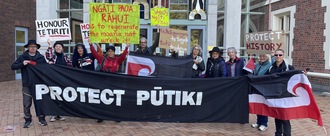
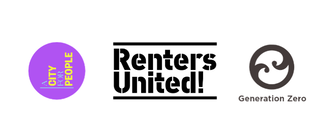

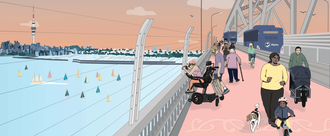

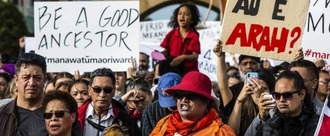

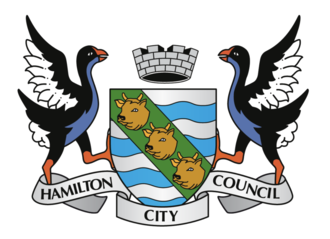

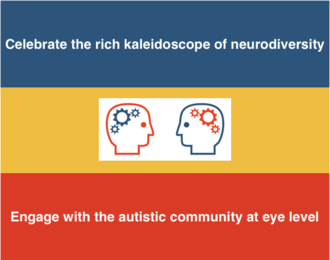
.png)